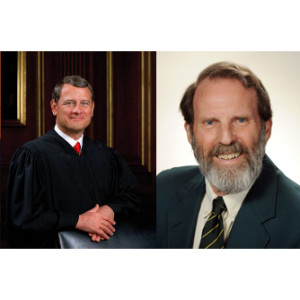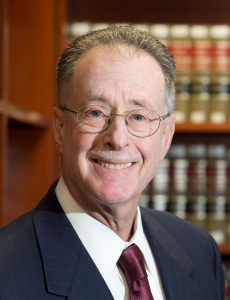Response by Dean Alan B. Morrison
Geo. Wash. L. Rev. Docket (Oct. Term 2014)
Bullard v. Blue Hills Savings Bank, 575 U.S. ___ (2015).
Docket No. 14-116; argued April 1, 2015; decided May 4, 2015
Slip Opinion | Oyez | SCOTUSblog
The Supreme Court does not like interlocutory appeals, and it proved it once again in its May 4, 2015 decision in Bullard v. Blue Hills Savings Bank, holding that a bankruptcy court’s rejection of a debtor’s plan under Chapter 13 was not final and hence not appealable as of right.1 The opinion, written by Chief Justice John Roberts, was unanimous, short (12 pages), and swift (33 days after oral argument).
The basis for the Court’s decision was the principal known as the “final judgment rule” under which, subject to certain specific exceptions, the federal courts will entertain appeals only from “final decisions.”2 The bankruptcy statute at issue in Bullard, 28 U.S.C. § 158(a)(1), is somewhat broader because there are often several separate controversies within a given bankruptcy proceeding, but the Court declined to allow an appeal as of right, largely because the case was not over since the debtor could file an amended plan.
The dislike for interlocutory appeals is not recent, although there was what now appears to be a temporary movement in the opposite direction in 1949. In Cohen v. Beneficial Industrial Loan Corporation,3 the Court created a narrow exception for certain “collateral orders.” However, over the years, the Court has generally refused to extend the exception in a variety of contexts including class certification rulings, orders granting or denying motions to disqualify counsel, and most recently the denial of a claim of attorney client privilege in Mohawk Industries v. Carpenter.4 Nor does this attitude favor only defendants or plaintiffs: Mohawk will largely help plaintiffs, whereas Bullard will mainly aid creditors who wish to pressure debtors into paying more to get their plans approved. I said mainly because, although the Bullard opinion does not reflect this, the debtor was supported by the United States and Bank of America, both of whom are perennial creditors in individual bankruptcy cases. They wanted interlocutory review because there was a significant legal issue in the case, and it would be much less likely to be resolved unless interlocutory review is available.
The Court did not deny that interlocutory review might be appropriate in this case, but concluded that there would be many other cases in which it not be appropriate, and yet the appealability rule that the debtor sought would apply across the board. The Court also accepted the fact that there would be hardships from denials of interlocutory appeals in some cases, but was unmoved, largely because that is a basic tradeoff in the final judgment rule. The Court also noted that there are some avenues for discretionary appeals of non-final orders, suggesting at two points5 that one may actually have been available for Bullard’s appeal to the First Circuit, but was not utilized (perhaps because an appeal of right had been used to go to the Bankruptcy Appellate Panel).
The final judgment rule is a fundamentally sound premise, but as everyone recognizes, some exceptions are needed. Some exceptions allow appeals of right by statute, such as 28 U.S.C. § 1292(a)(1) relating to grants or denials of preliminary injunctions. Others, such as 28 U.S.C. § 1292(b) and Federal Rule of Civil Procedure 23(f), are discretionary, and there is always mandamus, which is supposed to be confined to extraordinary circumstances, but seems to be available when a court really wants to get to the merits.6 There is, however, one point on which everyone agrees: a great deal of time is spent by lawyers and judges debating whether an issue is appealable, none of which helps resolve the merits of the underlying litigation. That surely makes no sense.
Fortunately, there is a way out that has been successfully used to promulgate Rule 23(f), which creates a right to ask the court of appeals to exercise its discretion to review an order granting or denying class certification. Under 28 U.S.C. § 2072(c) the Court has the authority to issue rules that “may define when a ruling of a district court is final under section 1291 of this title.” Lawyers who handle class actions all agree that a class certification ruling—either way—is often a watershed moment in a case, either because it means that the plaintiff will no longer be able to proceed without a class, or because the defendant will be under very strong pressure to settle in the face of a certified class. But instead of making the right to appeal absolute, Rule 23(f) makes it a matter of discretion for the court of appeals whether to hear the particular claim. And unlike section 1292(b), in which there are threshold requirements for the type of issues that can be heard, and the district judge who made the ruling has absolute discretion to be a gatekeeper and deny permission to seek an appeal, Rule 23(f) allows the losing party to ask the court of appeals to review the order based on the facts and law applicable to this case, without setting a precedent for any other case.
More than fifteen years ago, I co-authored an essay with Howard Eisenberg urging that the rule-writers consider issuing a general rule authorizing discretionary appeals of interlocutory orders, leaving it to the court of appeals to sort through those requests on a case by case basis.7 Nothing that has happened since then has changed by view that everyone—lawyers on both sides and judges at all levels—would be better off if less time were spent fighting over whether an appeal was authorized and more time focusing on whether the lower court got the correct result. If anything, Bullard and its immediate predecessor Mohawk confirm the need for a new way to look at this problem.
1. Bullard v. Blue Hills Bank, No. 14-116, slip op. (U.S. May 4, 2015).
2. 28 U.S.C. § 1291 (2012).
3. 337 U.S. 541 (1949).
4. 558 U.S. 100 (2009).
5. Bullard, slip op. at 4, 11–12.
6. See Cheney v. United States District Court, 542 U.S. 367 (2004).
7. Howard B. Eisenberg & Alan B. Morrison, Discretionary Appellate Review of Non-Final Orders: It’s Time To Change the Rules, 1 J. App. Prac. & Process 285 (1999).
Recommended Citation
Alan B. Morrison, Response, Bullard v. Blue Hills Savings Bank, Geo. Wash. L. Rev. Docket (May 7, 2015), http://www.gwlr.org/bullard-v-blue-hills-savings-bank/.



